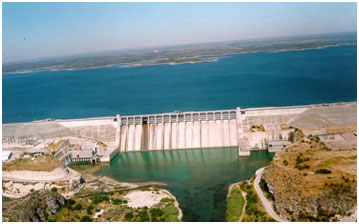
State wildlife biologists reported two dubious firsts Wednesday, announcing invasive quagga mussels have been found in Texas, and that they’re also the first invasive mollusk species to be found in the Rio Grande Valley.
Quagga mussels were discovered in Amistad International Reservoir near the city of Del Rio by sampling plankton for mussel larvae.
The first larvae were discovered in June at a testing site at Diablo East. Confirmation occurred over the next several months as larvae were detected at a second site, Rough Canyon. All were identified positively as quagga mussels via DNA testing.
Quagga mussels are close relatives of the zebra mussel, which has invaded 33 Texas lakes in six river basins since it was introduced accidentally into Lake Texoma in 2009. Both zebras and quaggas are native to Europe and are believed to have been brought to the Great Lakes in water ballast of ocean-going freighters sometime in the 1980s.
Both range in size from microscopic to about two inches at their largest.
“This detection of invasive quagga mussels is a very unfortunate first for Texas,” said Monica McGarrity, TPWD senior scientist for aquatic invasive species. “Quagga mussels can inhabit greater depths and are also able to settle on soft substrates like mud or sand in addition to hard surfaces like rock or infrastructure — unlike zebra mussels — meaning they can colonize more of the lake.”
“Quagga mussels are very prolific and can form larger populations that can have greater effects on the lake ecosystem overall, especially in deep lakes,” added McGarrity.
There is no treatment to remove zebra or quagga mussels from a body of water, and efforts instead focus on keeping them from spreading.
The quagga mussels were discovered in Amistad by National Park Service staff who have been monitoring the lake for invasive mussel species since 2014. Currently, NPS employees conduct monthly inspections of docks and structures at several sites on the reservoir, and even use mussel-detecting dogs along the shore to sniff them out.
TPWD officials say the discovery of quaggas in Amistad means anglers and boaters need to exactly follow guidelines to clean their boats and outboards after using them on infested waters. The spread of both zebra and quagga mussels has been linked to recreational boating.
Both NPS and TPWD officials encourage all visitors to follow the “Clean, Drain, and Dry” actions for watercraft and equipment before entering and after leaving the lake.
By law boaters are required to drain all water from their vessel and onboard receptacles, including bait buckets, before leaving or approaching a body of fresh water. Fines are up to $500 per incident for transporting invasive mussels, even unintentionally.
TPWD encourages anyone who spots invasive mussels on a boat, trailer or outboard motor to immediately report the sighting at 512-389-4848.
If you discover what you think may be an invasive mussel, TPWD requests you report it immediately by emailing photos and location information to [email protected].
Both zebra and quagga mussels are filter feeders and can sift so much microscopic phytoplankton out of a body of water, the larger zooplankton that feeds on it decreases as a result. This disruption of the food chain eventually impacts all species in the ecosystem, including game fish.
Clusters of mussels also clog power plant and water system intakes, creating major costs for utilities forced to constantly clean underwater structures to remove mussel colonies.




